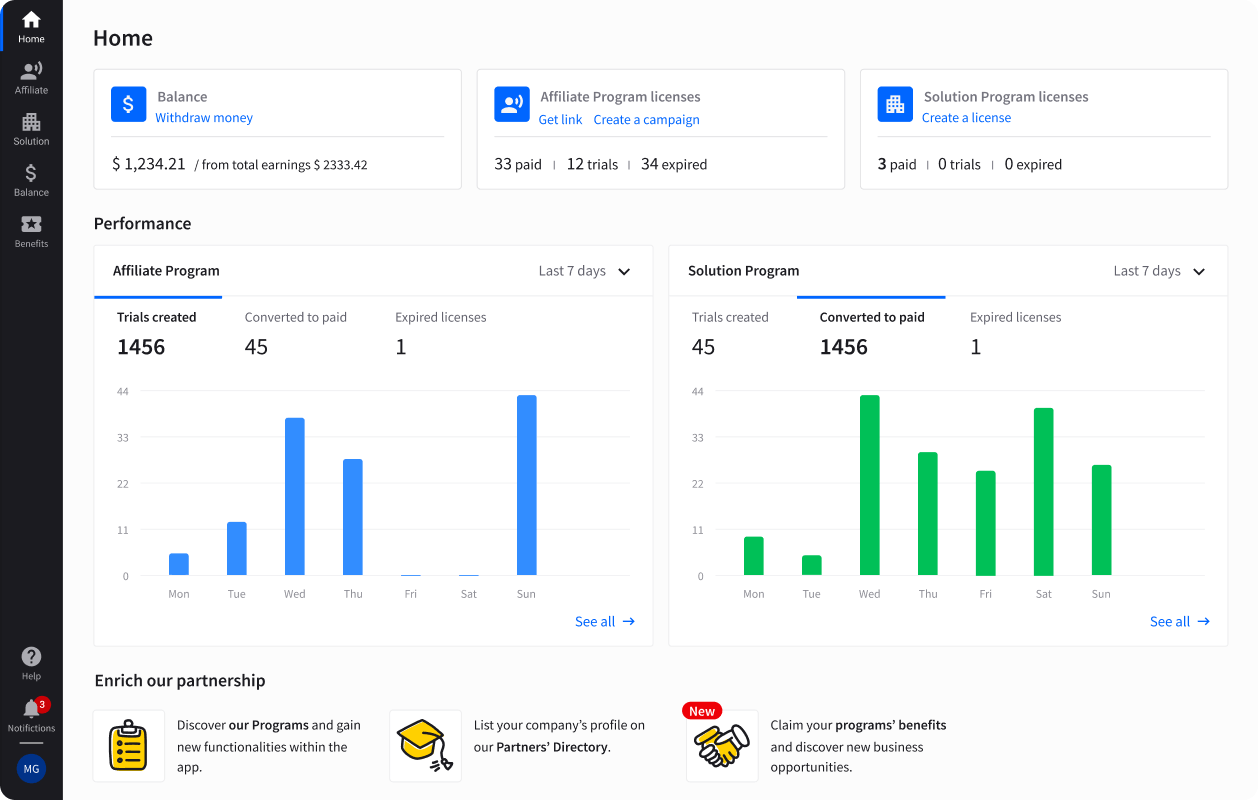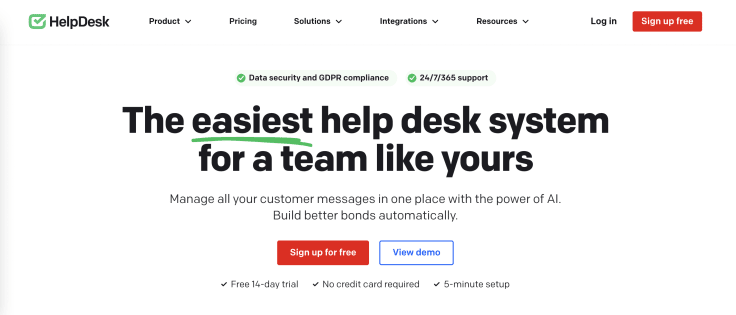Showing top 0 results 0 results found
Showing top 0 results 0 results found

Why is software reselling a golden opportunity?
Well, picture this: low startup costs, the potential for recurring revenue, and no need to invent the next big thing—because the software’s already made! As a reseller, you don’t have to worry about development or maintenance. Instead, you focus on connecting people with the right solutions while earning commissions, often on a subscription basis.
And the best part? You can scale as you grow. Start small, expand your portfolio, and build long-term customer relationships. You’re not just selling products—you’re selling value, expertise, and convenience. Plus, with flexible work options, you can run your business from anywhere.
In other words, software reselling is a great opportunity to dive into the tech industry with minimal risk and huge upside potential!
But let's start from the beginning.
What Is a Software Reseller?
A software reseller is a business or individual that purchases software products from a vendor or developer and then sells them to end-users, often for a profit.
The business model allows resellers to act as intermediaries between the software vendor and the customer, facilitating the sale and support.
Resellers usually benefit from partnering with software vendors through formal reseller programs. These programs provide them access to software licenses, marketing materials, training, and often a commission or margin for each sale.
The primary objective of a reseller is to connect the right customers with software solutions that meet their needs, making the sales process smoother for both the vendor and the customer.
The benefits of becoming a software reseller are not limited to:
- Low Initial Investment: Software reselling often involves minimal startup costs. There’s usually no need for significant inventory or infrastructure, allowing resellers to start with just a computer and an internet connection.
- Recurring Revenue Model: Many SaaS products operate on a subscription basis, providing resellers with the potential for steady, recurring income. This model can lead to long-term customer relationships and consistent revenue streams.
- Flexibility and Scalability: The business can be operated remotely, offering flexibility in work location. Resellers can easily scale their operations by expanding their product offerings or reaching new customer segments as demand increases.
- Diverse Product Options: Resellers can access various software categories, including SaaS, cybersecurity solutions, business applications, and more. It allows them to cater to various market needs and preferences.
Join the perfect program for resellers
Join our Solution Program and start reselling one of the best SaaS communication products!

Types of Resellers
Understand the types of resellers to determine which business model aligns best with your strengths and target market. Here are three main categories:
1. Volume Resellers
Volume resellers specialize in selling large quantities of software, often targeting businesses or organizations that require multiple licenses or high-volume purchases.
Their business model focuses on scaling sales to drive profit, typically through bulk discounts. These resellers work closely with large enterprises, government agencies, or educational institutions that need software for numerous employees or users.
The success depends on maintaining a high sales volume. Also, they benefit from strong relationships with vendors, enabling them to offer competitive pricing to their customers.
2. Specialty Resellers
Specialty resellers focus on a specific type of software or market segment. These resellers carve out a niche by becoming experts in one area, such as security software, healthcare management systems, or cloud-based collaboration tools.
Their deep understanding of their chosen market segment allows them to tailor their marketing and sales strategies to meet the unique needs of their clients. Specialty resellers often offer personalized advice and can help customers select the most suitable solutions for their particular industry or use case.
3. Value-Added Resellers (VARs)
Value-added resellers not only sell software but also provide additional services such as installation, customization, training, and ongoing support. By enhancing the software with these services, VARs create a more comprehensive solution for customers.
VARs are particularly beneficial for businesses that require software to be integrated with their existing systems or customized to meet specific operational needs.
Understand the Reselling Business Model
Resellers can adopt different business models to earn margins, commissions, or recurring revenue. The options include:
1. SaaS Reselling
SaaS (Software-as-a-Service) reselling involves purchasing software licenses from a vendor and selling them to end users. Resellers may offer additional services like training or support but primarily act as intermediaries between the vendor and the customer.
SaaS reselling benefits from recurring revenue through subscription-based pricing models, offering long-term revenue streams. Resellers usually don’t need to invest heavily in infrastructure or software development, making this a low-risk way to enter the market.
It is an attractive option for those who want to offer cloud-based solutions in areas like customer support, project management, or business analytics without building the product themselves.
2. White-Label SaaS Reselling
In the white-label reselling model, resellers purchase software from a vendor and rebrand it as their own. The reseller can fully customize the branding, and the end customers often don’t know that another company produces the software.
The model is ideal for businesses looking to build their brand while offering high-quality software solutions without the development cost. White-label reselling also allows resellers to bundle software with their services, increasing client value.
3. Affiliate Program
Affiliate marketing programs are a less hands-on reselling model where individuals or companies promote software products on behalf of vendors. Affiliates earn a commission on each sale made through their referral links.
Unlike traditional software reselling, affiliates don’t handle transactions or provide customer support. Thus, this model is low-risk and ideal for bloggers, content creators, and marketers who want to monetize their audience without direct involvement in sales or services.
Affiliates can promote software to a wide audience across multiple regions and industries. Many SaaS affiliate programs provide resources like banners, links, and dashboards to help affiliates track their performance.

Steps to Become a Software Reseller
Becoming a software reseller can be lucrative, particularly in the ever-evolving tech landscape. Here are the steps to guide you through the process:
1. Identify the Right Software to Sell
Conduct thorough research to find software with high demand and profitability. Here’s how to go about it:
- Market Analysis: Start by examining software market trends to identify categories that are in demand. Tools like Google Trends, industry reports, and software review sites can provide details about popular products and emerging technologies.
- Competitive Analysis: Analyze existing competitors in your chosen niche. Look for gaps in their offerings, customer complaints, or unmet needs that you could address. Identify top competitors’ pricing, marketing strategies, and customer engagement methods.
- Profitability Assessment: Evaluate the profit margins of potential software products. Speak with other software resellers or consult vendor pricing structures to understand commission rates, discounts, and recurring revenue potential.
- Customer Needs: Conduct surveys or engage in forums to gather insights about the pain points your target audience experiences. This feedback can help you identify software that genuinely addresses customer needs.
- Regulatory and Compliance Considerations: Consider any regulations or compliance requirements relevant to the software you wish to resell. This is particularly important in industries like healthcare or finance, where software must meet specific standards.
-> 35 Best Reseller Programs You Can Join Today
-> Evaluate how much you can earn as software reseller with our comission calculator
2. Partner with a Software Vendor
Once you've identified the right software, the next step is to partner with a vendor:
- Research Vendor Programs: Look for top software reseller programs. Many companies provide dedicated programs for individuals or businesses interested in reselling their software solutions.
- Application Process: Follow the application process outlined by the software provider. This may involve filling out an application form, providing details about your business model, and demonstrating your ability to market and sell their product.
- Building Relationships: Establish relationships with the vendor’s sales or support teams. Open lines of communication can facilitate better understanding and collaboration, making resolving issues easier and enhancing your sales strategy.
- Review Program Benefits: Understand the benefits provided by the vendor’s reseller program. This may include access to training materials, marketing collateral, sales support, and a dedicated account manager for reseller partnerships.
3. Develop Your Reseller Business Plan
A well-structured business plan is essential for guiding your reseller efforts:
- Target Market: Define your target audience based on the software you intend to resell. Consider factors such as industry, company size, and geographic location. The more specific you are, the better you can tailor your marketing efforts to resell software.
- Sales Strategy: Outline how you will acquire customers and close sales. Will you use direct outreach, content marketing, or paid advertising? Identify key performance indicators (KPIs) to measure the effectiveness of your strategy.
- Revenue Model: Determine how you will earn money. Will you focus on one-time sales, subscription services, or a combination of both? Understanding your revenue streams will help you forecast income and manage cash flow while reselling software.
- Marketing Approach: Develop a marketing plan that aligns with your target market. Consider utilizing SEO, social media, email, and content marketing to generate leads and drive traffic to your sales platforms.
4. Set Up Your Online Presence
Establishing a strong online presence is vital for attracting customers:
- Professional Website: Create a professional website as your primary sales platform. The website should include detailed product information, pricing, and a user-friendly layout. Ensure it is mobile-responsive and optimized for search engines.
- eCommerce Functionality: If you're reselling software directly, integrate eCommerce functionality into your website. This allows customers to make purchases seamlessly and can streamline order processing.
- Social Media Integration: Leverage social media platforms to reach your audience. Create profiles on relevant networks (LinkedIn, Facebook, Twitter) and regularly post content that showcases the software you are selling.
- Content Marketing: Utilize blogs, videos, and case studies to demonstrate the software's benefits and educate potential customers. High-quality content can help build trust and authority in your niche.
- SEO Optimization: Invest time in search engine optimization to improve your website's visibility on search engines. Focus on relevant keywords, meta descriptions, and high-quality backlinks to enhance organic traffic.

5. Learn About the Product and Get Trained
Gaining in-depth product knowledge is critical for success as a software reseller:
- Vendor Training: Most software vendors offer training sessions or marketing support to help resellers understand the software's features and benefits. Participate in these training programs to enhance your product knowledge.
- Hands-On Experience: Use the software yourself to gain firsthand experience. This will help you better understand its functionality and usability, allowing you to demonstrate it to potential customers effectively.
- Stay Updated: Technology evolves rapidly, so it’s essential to stay informed about new features, updates, and industry trends. Subscribe to vendor newsletters and participate in online communities related to the software.
- Value-Added Services: If you’re reselling software as a VAR, focus on developing skills to offer additional services such as implementation, customization, or ongoing support.
6. Start Marketing and Selling
Once you’ve established your business, it’s time to begin marketing and selling your software:
- Create Marketing Campaigns: Develop targeted marketing campaigns using various channels such as email, social media, and online ads. Tailor your messaging to address the specific pain points of your target audience.
- Lead Generation: Use lead generation techniques such as webinars, free trials, or downloadable resources to attract potential customers. Offer valuable content that positions you as an expert in your field.
- Networking: Attend industry events, trade shows, or webinars to connect with potential customers and partners. Building a network can lead to valuable referrals and new business opportunities.
- Sales Outreach: Implement direct sales strategies, including cold calling, emailing, or engaging with leads through social media. Personalize your approach to increase the likelihood of closing sales.
7. Manage Customer Relationships and Provide Support
Building strong customer relationships is essential for long-term success:
- Ongoing Support: As a reseller, you should continuously support your customers. It includes answering questions, resolving issues, and offering effective guidance on using the software.
- Troubleshooting: Be prepared to assist customers with troubleshooting and technical challenges. A solid understanding of the software will enable you to provide quick and efficient solutions.
- Upselling Opportunities: Look for opportunities to upsell or cross-sell additional products or services that could benefit your customers. Building a comprehensive relationship can lead to higher customer satisfaction and increased sales.
- Feedback Collection: Regularly seek feedback from your customers to understand their experiences with the software. The information can help you refine your sales strategy and enhance customer support.
- Customer Retention: Focus on customer retention by nurturing relationships and offering loyalty programs or incentives. Satisfied customers are likelier to renew their subscriptions or recommend your services to others.
Become a successful software reseller through in-depth research, strategic planning, and ongoing customer engagement. That way, you can meet customer needs and generate sustainable income.

How to Price Software for Reselling?
Pricing software for reselling requires careful consideration of vendor pricing models, customer expectations, and your business goals. You can approach it as:
- Understand Vendor Pricing Models: Review common vendor pricing structures such as wholesale pricing (buying at a discount and reselling at market price), tiered pricing (different pricing levels based on volume), and commission-based models (earning a percentage of each sale).
- Add Value with Service Packages: Bundle value-added services like software installation, customization, training, or ongoing support to justify premium pricing. These packages differentiate you from competitors and increase customer satisfaction.
- Setting Competitive Prices: Analyze competitor pricing to ensure you offer competitive rates while maintaining a healthy profit margin. Factor in your costs, such as marketing and support, and consider positioning yourself slightly above competitors if you provide additional value.
- Offer Flexible Payment Plans: Attract more customers by offering flexible payment options like monthly subscriptions, annual payments with discounts, or installment-based plans.
Marketing Strategies for Software Resellers
Effective marketing strategies drive sales and build a solid reseller software business. Here are key tactics to reach your target audience and boost conversions.
1. Targeted Online Advertising
Paid advertising platforms such as Google Ads and social media ads (Facebook, LinkedIn) allow resellers to target potential customers precisely based on their interests, industries, and behavior.
By creating targeted campaigns, you can reach customers who are actively searching for the software solutions you offer.
2. Content Marketing and SEO
Educational content like blog posts, webinars, and case studies can establish your authority as a software expert. By producing high-quality, informative content, you attract potential customers who are researching solutions to their problems.
Optimizing this content with relevant keywords through SEO techniques will further boost your visibility on search engines. You can drive organic traffic to your site and increase your credibility as a trusted reseller.
3. Email Marketing for Lead Nurturing
Building an email list is key to nurturing leads over time. Use email marketing to engage potential customers by sharing relevant content, promotions, and product updates.
Personalized campaigns based on a customer’s interactions with your brand help maintain interest and guide leads toward purchasing. Automating drip campaigns can ensure consistent communication with prospects at different stages of the buyer journey. You can also utilize social media platforms to attract customers.
4. Customer Testimonials
Showcasing testimonials and case studies from satisfied customers can build trust and credibility. By sharing real-world success stories, you demonstrate the value of the software and your ability to meet customer needs. Testimonials act as social proof, making potential customers more confident buying from you.
Building Long-Term Relationships with Clients
To create a loyal customer base and steady business growth:
- Provide ongoing support, training, and regular follow-ups to keep customers satisfied. Address the issues quickly and ensure customers get the most from their software.
- Tailor your recommendations to individual customer needs. Personalizing software solutions adds value beyond the initial sale, making customers feel understood and appreciated.
- Look for opportunities to offer complementary products or services. Regularly review client needs to identify when to suggest upgrades or new features.
- Encourage satisfied customers to refer others. Also, offering referral incentives or leveraging word-of-mouth marketing can generate more leads and establish your business as trustworthy in the reseller space.

Managing and Growing Your Software Reseller Business
For the long-term success of your business, you need to scale operations and stay ahead of competitors.
a. Utilize CRM Tools
Customer relationship management tools are essential for tracking customer interactions, sales, and support activities. A CRM system allows you to store customer data, manage sales pipelines, and automate follow-ups.
It ensures that no potential lead or service request is overlooked. By centralizing communication, you can provide better support, maintain relationships, and streamline your sales efforts.
b. Scale Your Operations
As your business grows, consider expanding by adding new product lines or entering new markets. Hiring sales and support teams can help manage the increased workload and reach a broader customer base. You may also explore partnerships with additional software vendors to diversify your offerings.
c. Diversify Your Revenue Streams
While software sales are the primary focus, you can offer value-added services like consulting, customization, or training, as they can provide additional revenue streams. It'll deepen customer relationships and increase your profit margins.
d. Handling Competition
Standing out in a crowded reseller market requires more than just competitive pricing. Focus on offering superior customer experiences by providing personalized service and comprehensive support.
Developing unique service bundles, such as bundled training or enhanced support, can differentiate you from competitors and create more value for your clients.
The LiveChat Partner Program: Your Gateway to Success
The LiveChat Partner Program offers a structured framework for resellers to access top-tier communication solutions, including LiveChat, ChatBot, and HelpDesk.
The program features a robust affiliate structure with up to 22% commission on sales, a 120-day cookie duration for credit on referrals, and a dedicated Partner App for tracking campaign performance.
Unique to the Solution Program are personalized onboarding, demo accounts, and tiered benefits, including co-marketing opportunities and priority support.
As you advance through the Bronze, Silver, and Gold tiers, you unlock additional rewards and greater visibility on the LiveChat Marketplace.
With no membership fees, partners can immediately start offering premium communication solutions to their clients, creating new revenue streams while enhancing customer engagement.
Conclusion
Becoming a software reseller opens up exciting opportunities for individuals and businesses looking to expand their revenue streams. You can tailor your approach to fit your market by understanding the different reseller models.
The benefits, including low startup costs, recurring revenue streams, and the ability to offer diverse software products, make this venture appealing.
Now is the time to take the next step in your software reselling journey. Start by researching potential SaaS companies and exploring reseller programs that align with your business goals.
Joining programs like our Partner Program can enhance your success, offering valuable resources, training, and competitive commission structures.
Don’t wait—begin your journey in the dynamic world of software reselling today!


